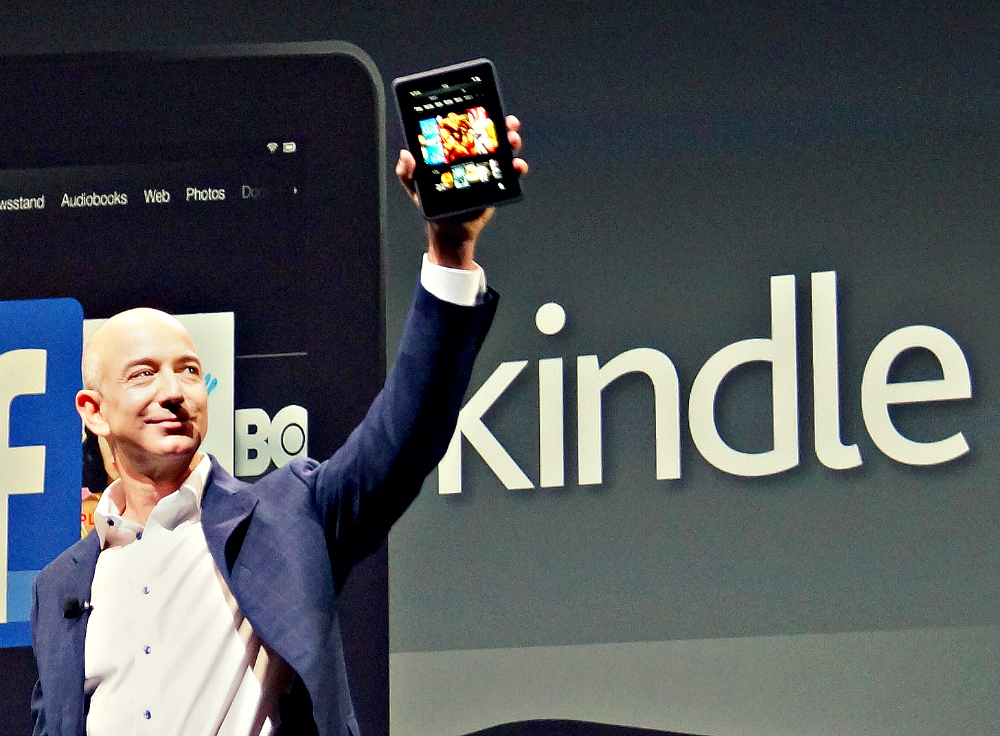 When journalist Brad Stone first sat down with Jeff Bezos to discuss his plan to write a book about Amazon, he knew he was facing long odds in trying to win the CEO’s cooperation. As Stone explained in an interview this week, Bezos typically has “an instantaneous allergic reaction” to such proposals.
When journalist Brad Stone first sat down with Jeff Bezos to discuss his plan to write a book about Amazon, he knew he was facing long odds in trying to win the CEO’s cooperation. As Stone explained in an interview this week, Bezos typically has “an instantaneous allergic reaction” to such proposals.
So Stone decided to “observe Amazon’s customs” in his meeting with Bezos, bringing a fictional press release that envisioned how the book would ultimately be presented to readers. This is a standard practice for new product and feature proposals at the company, a reflection of the company’s principle of “starting with the customer and working backward.”
When Bezos realized what Stone was doing with the press release, “he laughed so hard that spit came flying out of his mouth,” Stone writes.
In the end, Bezos didn’t sit down with Stone for hours of interviews, as Steve Jobs did with his authorized biographer, Walter Isaacson. Bezos considered it “too early” for a definitive account of the company — which by itself reveals a lot about his ambitions for Amazon.
However, Bezos was “supportive” of the project and approved interviews with Amazon executives and his own family and friends, which supplemented Stone’s extensive independent reporting.
The result is the new book “The Everything Store,” set for release on Tuesday.
It might not be an “authorized” account, technically, but the book clearly benefits from the access — providing a comprehensive explanation of Amazon’s history and culture, documenting its journey from a rental house in Bellevue, Wash., to the company’s massive urban campus in Seattle’s South Lake Union neighborhood. It’s a startup story, first and foremost, including Amazon’s early struggles to build and manage what became a massive e-commerce and distribution empire.
The book also offers new details about the company’s practices and internal strategies, and an unvarnished look at Bezos’ aggressive and at times abrasive leadership style.
For example, in 2006, with rumors of the Kindle project running rampant inside the company, an employee at an all-hands meeting asked Bezos if he could talk about Lab126, the Kindle R&D unit that was supposed to be secret even inside the company.
 “It’s a development center in Northern California,” Bezos said. “Next question.”
“It’s a development center in Northern California,” Bezos said. “Next question.”
When Bezos discovered that expensive monitors had been installed in Amazon conference rooms for remote collaboration among employees, he ordered them removed but made sure the mounts remained for a while as a reminder of the stupid decision that someone had made.
When the Kindle was publicly unveiled, Stone recounts how Amazon and Bezos surprised the major book publishers by announcing what would become a standard $9.99 price for e-books, without telling them in advance about plan. Publishing executives were shocked.
“I think we were absolutely naive in agreeing to supply those (e-book) files without any caveats around them,” one tells Stone, adding that he felt like he was “asleep at the tiller” in the negotiations with Amazon.
For people seeking to understand what can be an enigmatic company, the book does a great service in explaining the psychology of Amazon, and the company’s role as an extension of Bezos’ brain.
The book also makes it clear that popular “Jeffisms” — principles frequently preached by Bezos — have much more complex motivations than it might seem from the outside. For example, Bezos’ common refrain that Amazon is “willing to be misunderstood for long periods of time” can also be a convenient excuse when the company is simply doing something inexplicable.
[Related: Amazon unpacked: Brad Stone on his new book, ‘The Everything Store’]
In the end, even with the access to Amazon execs, Stone’s shoe-leather reporting is what makes the book stand out. As detailed in excerpts published last week, he found Jeff Bezos’ biological father — informing the man about his son and filling in an important gap in the Amazon CEO’s personal history.
He also unearthed an obscure book from the 1970s, about a gifted education program in Houston, Texas, which focused in part on a young Jeff Bezos, using a pseudonym. That find by Stone provides an extraordinary level of detail about what Bezos was like as an elementary school kid — including the survey the young Bezos created to evaluate the sixth-grade teachers at his school.
The author of that book, Julie Ray, told Stone that she recalled one of Bezos’ elementary teachers saying, “there is probably no limit to what he can do, given a little guidance.”
Brad Stone, the author of “The Everything Store: Jeff Bezos and the Age of Amazon,” will be our guest this weekend on the GeekWire Radio show. He’ll also talk about the book Oct. 22 at Seattle’s Town Hall. Tickets available here.



